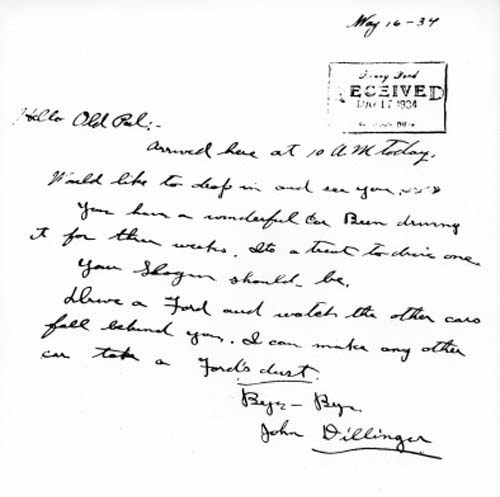 |
Audio Asylum Thread Printer Get a view of an entire thread on one page |
For Sale Ads |
 |
Audio Asylum Thread Printer Get a view of an entire thread on one page |
For Sale Ads |
122.249.78.59
In Reply to: RE: In your world, "gangsters" are all scowling misanthropes. Dillinger posted by tinear on January 18, 2010 at 21:28:30

Here, he writes a letter to Henry Ford in 1934"Hello Old Pal,
Arrived here at 10:00 AM today. Would like to drop in and see you.
You have a wonderful car. Been driving it for three weeks. It's a treat
to drive one. Your slogan should be, drive a Ford and watch the other
cars fall behind you. I can make any other car take a Ford's dust!Bye-bye,
John Dillinger"Bonnie Parker wrote poetry + sent this to newspapers + was published nationwide including "The Ballad of Bonnie + Clyde" + not to be outdone, Clyde Barrow wrote a letter to Ford as well thanking him for the reliability of the Ford V-8's ( he stole )
This is the "Dillinger" I wanted to see; vicious for sure, but also a certain back-woodsy + cocky humour that's hard, even now, not to admire
Not a hint of this in "Public Enemies"
GW
Edits: 01/19/10Follow Ups:
There wasn't a trace of 'Public Enemies' in Public Enemies. 'Public Enemies' was a book (that I read) detailing the infamous timeframe in which the outlaws Dillinger, Nelson, Floyd, the Barkers, and Bonnie & Clyde thrived in. The premise of the book that I found interesting was that these criminals lived and thrived in what was surprisingly, a very short timeframe. Although having read many books about these guys, for whatever reason, I never put together the reality that they only existed for a very short time. More interesting to counterpoint the fact that the TRUE gangsters, names like Luciano, Genovese, Bonanno, etc. flew largely under the radar in no small part, thanks to the cowboy-hick antics of the Public Enemies. I was hoping to see THIS story on the screen and was really dissapointed, as I love a good Mob movie!
That showing Dillinger had a human and humorous side is blasphemy. He was a killer, and showing him with style, wit, and humor is akin to excusing his acts. I think Ebert's review nailed it on the head. The point of the film was to show the mechanics of Dillinger, not the pathos.
Post a Followup:
| FAQ |
Post a Message! |
Forgot Password? |
|
||||||||||||||
|
||||||||||||||
This post is made possible by the generous support of people like you and our sponsors: